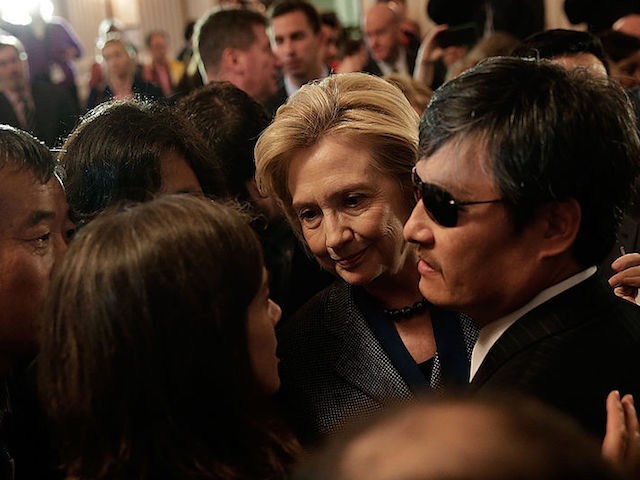In a private speech in 2013, Democratic presidential nominee Hillary Clinton reportedly took credit for the liberation of Chinese dissident attorney Chen Guangcheng, calling it “one of those moments where you have to think hard about what America really stands for.”
Chen later accused Clinton, then Secretary of State, and Washington of “giving in” to the Communist Chinese government and nearly abandoning him when he asked for political asylum.
The excerpt from the speech, allegedly to attendees of the Jewish United Fund Of Metropolitan Chicago Vanguard Luncheon in October 2013, is part of a larger document dump posted online by Wikileaks last week. Wikileaks published a more searchable version of the private speech database on Monday. Over the weekend, Democrats did not affirmatively deny the veracity of the documents in question, but Clinton running mate Tim Kaine told CNN, “I don’t think we can dig in documents dumped by WikiLeaks and just assume they’re all accurate and true.” He did not elaborate.
In the speech in question, Clinton says she had a part in “helping a blind Chinese dissident get safety in the American Embassy in Beijing and then negotiating with the Chinese to get him and his immediate family out of China.”
“That was one of those moments where you have to think hard about what America really stands for so when I got a call late one night saying that Chen Guangcheng had escaped from his house where he had been under house arrest, he’d been picked up by sympathizers and he was on his way to Beijing and he wanted safety in the American Embassy, there were many who said, ‘Don’t do it, we’ll totally destroy our relationship with the Chinese government,’” Wikileaks quotes Clinton as saying.
Clinton allegedly made those remarks two years before Chen would write his memoir, The Barefoot Lawyer, about his escape to the United States, but one year before Clinton had published her own memoir, Hard Choices. In that book, Clinton also took credit for freeing Chen, writing that she and other American diplomats did “what Chen said he wanted every step of the way.”
Chen’s version of events in his 2015 differ significantly from Clinton’s. Chen, who worked as an attorney in China defending women the government forced to have abortions as part of its one-child policy, had been placed on house arrest for years due to his activism. In 2012, he escaped house arrest and fled to a U.S. embassy. There, he demanded political asylum for himself and his family.
“No one seemed to be putting pressure on the Chinese Communist Party;” Chen wrote of his experience at the embassy, “instead they were dumping shipping containers of weight onto my shoulders to get me to do their bidding. Suddenly I was overcome by sadness and wept.”
“I hadn’t expected so many people on both sides would be working so hard to get me to leave [the embassy], without guaranteeing my rights or my family’s safety,” he added. Of the Obama administration, he wrote in his book, “What troubled me most at the time was this: when negotiating with a government run by hooligans, the country that most consistently advocated for democracy, freedom, and universal human rights had simply given in.”
American officials, he wrote, attempted to pressure him into staying in China under the auspices of a Chinese university, even after being invited by New York University to work on their Shanghai campus.
Chen initially agreed to stay in China after what he described as immense pressure, but later recanted and demanded a seat on Hillary Clinton’s flight out of China. She was visiting the nation in May 2012. Clinton did not taken Chen with her. Chen left a few weeks later, on another NYU invitation, and has lived in the United States since.

COMMENTS
Please let us know if you're having issues with commenting.